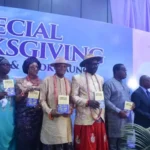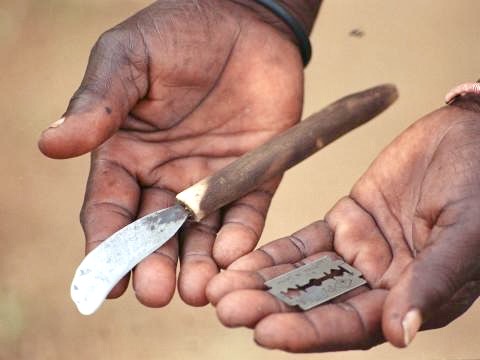By Usman Aliyu, News Agency of Nigeria (NAN)
When Blessing Ogo recalls the day she was cut, her voice trembles. Her memory of that moment, such as the searing pain, the blood, and the fear, remains as vivid as yesterday.
“I still struggle to enjoy intimacy with my partner. The trauma lingers. I feel less feminine,” she says quietly.
Ogo is one of millions of Nigerian women living with the physical and emotional scars of Female Genital Mutilation (FGM), a deeply rooted cultural practice that involves the partial or total removal of external female genitalia for non-medical reasons.
“I call it barbaric,” she continues, calling on those who still do it to stop because it destroys lives.
Ogo was among survivors and former practitioners who gathered in Benin City, Edo, recently, for a two-day media dialogue organised by the Oyo State Ministry of Information and Orientation in collaboration with the UN Children’s Fund (UNICEF).
Their testimonies revealed a painful truth.
FGM, far from curbing promiscuity as often claimed, causes lifelong suffering for its victims.
For decades, Female Genital Mutilation has been justified under the guise of cultural preservation, chastity, and cleanliness.
Yet, survivors’ stories expose it as an act of violence, a violation of girls’ rights and bodily autonomy.
A 38-year-old survivor from Enugu, Bature Baci, recounted how she was cut without consent as a teenager.
Years later, she herself became a practitioner, performing the procedure on young girls.
“I joined at 25. We used no anaesthetic. The girls bled severely. Some fainted,” she narrated.
Now a remorseful advocate against the act, Baci described her transformation as “liberation through pain.”
She joined the awareness movement after learning from UNICEF partners about the irreversible harm the practice causes.
Another former cutter, Bridget Omobude, a 56-year-old Traditional Birth Attendant from Benin, said she inherited the act from her great-grandmother.
“It was our family tradition. When babies were brought, we thought we were caring for them,” she explains.

However, when her daughter confronted her years later, she stopped.
“I regret cutting my own daughter. We are no longer close. That pain broke our bond,” she says with tears in her eyes.
For Sarah Adeola, a mother of five, her story is a painful reminder of blind obedience to cultural expectations.
“I cut my first three daughters. People said uncut girls won’t stay in their husbands’ homes. I believed them,” she admits.
Her perspective changed after meeting a nurse who explained the health and psychological dangers of FGM.
“I cried for days. I realised I had harmed my girls, not protected them,” she says.
According to the World Health Organisation (WHO), FGM has no health benefits and can lead to immediate complications such as severe bleeding, infections, urinary problems, and even death.
Long-term effects include chronic pain, menstrual disorders, sexual dysfunction, complications during childbirth, and post-traumatic stress disorder (PTSD).
In Nigeria, nearly 20 million women and girls have undergone FGM, the third highest globally, after Egypt and Ethiopia, according to UNICEF’s 2023 data.
Based on data from the 2021 Multiple Indicator Cluster Survey (MICS), the prevalence in Nigeria remains 15 per cent among women aged 15 – 49, a figure that represents a decrease from 18 per cent in the 2016–2017 survey.
While the national rate is declining, major disparities persist in states.
The states with the highest rates of FGM according to the latest study include Kwara, 35 per cent; Imo, 37.9; and Oyo, 42.7.
States with the lowest prevalence rates, at less than one per cent, are Adamawa and Gombe.
While religion is often cited to justify the practice, faith leaders are pushing back.
For instance, Pastor Ken Izah, of the Ark of Refuge Christian Centre in Benin, said FGM has no biblical basis.
“From the Bible’s standpoint, God does not support it. In Genesis 17:10, circumcision was for male children, not females.
“Sarah was never circumcised. FGM has no place in God’s plan or in our community,” he said.
Izah, a father of two girls, said he once intervened to stop a father from cutting his daughter after the man’s parents pressured him.
“We must speak out from the pulpit and at home. Faith must not be used to destroy our daughters,” he stated.

Beyond the individual trauma, FGM has national implications.
According to UNICEF, Nigeria accounts for one in four survivors of FGM worldwide.
Albeit its prohibition under the Violence Against Persons (Prohibition) Act, 2015, and similar state laws, enforcement remains weak in many communities where cutters still operate secretly.
UNICEF’s Chief of Lagos Field Office, Celine Lafoucriere, warned that “being blind or deaf to such a huge number of victims is unacceptable.
“This is a violation of human rights. No cultural or traditional practice should compromise a girl’s health, rights, or future.”
Lafoucriere said progress was visible through collaborations like the Movement for Good, spearheaded by Nigeria’s federal government with UNICEF support.
“Millions of Nigerians have pledged to protect girls from being cut. Communities are speaking out, survivors are leading, and the media has a powerful role to sustain this momentum,” she notes.
Similarly, UNICEF Communication Officer, Blessing Ejiofor, urged journalists to “use their platforms to tell stories that spark change.”
“It’s now a criminal offence to engage in FGM. But laws alone won’t stop it. We need stories that touch hearts and change minds,” she says.
Ejiofor said the current advocacy aimed for total elimination, not mere reduction.
“Every voice matter, especially survivors and reformed practitioners. They are the most credible advocates,” she adds.
Also, Denise Onoise, UNICEF’s Child Protection Specialist, said testimonies from victims prove that the myths sustaining the practice are false.
“FGM doesn’t curb promiscuity; it only inflicts pain. We must reach community leaders who can declare their villages FGM-free,” says the child specialist.
On his part, Mr Rotimi Babalola, Permanent Secretary, Oyo State Ministry of Information and Orientation, said his ministry’s collaboration with UNICEF reflected the government’s “commitment to issues affecting children”.
“We’ve done advocacy with security agencies and the judiciary. Now the media must help us reach every corner of the country,” he says.
FGM, though ancient, is not immutable. The MCI 2021 data show a gradual decline in Nigeria’s prevalence rate among girls aged 0 – 14 also, to 8.2 per cent.
These declines, experts say, is the result of sustained advocacy, education, and community-based dialogues.
Yet, millions remain at risk.
The UN Population Fund (UNFPA) warns that if current trends continue, 68 million girls worldwide could face FGM by 2030, with Nigeria among the top contributors.

For Doris Akare, a private school teacher from Lagos, the fight against FGM is personal. She was cut at just eight days old.
“I spent three months at the Lagos University Teaching Hospital after the procedure. I almost died,” she recalls.
Her story underscores the urgency of grassroots education.
“Elders still pressure families who refuse to cut their girls. We must take this message to the rural communities where ignorance fuels the cycle,” she advises.
Akare urged Civil Society Organisations (CSOs) and policymakers to enforce the law more vigorously.
“The awareness campaigns are good. But without enforcement, cutters will keep operating underground,” she says.
Inarguably, the stories from Benin are painful but also powerful testimonies of transformation and hope.
Survivors like Blessing, Bridget, Sarah, and Doris are reclaiming their voices, turning trauma into advocacy.
UNICEF estimates that if current efforts accelerate, Nigeria could become FGM-free within a generation.
But the task demands persistence from government, faith leaders, traditional rulers, health professionals, and the media alike.
As Blessing put it, her voice trembled but firm. “We are the last generation that should suffer this. Let’s make sure no girl after us is cut,” she says.
In the end, the call from Benin rings clear. FGM is not culture.
It is cruelty disguised as tradition; and through survivors’ courage, ex-cutters’ confessions, and the power of collective action, Nigeria is slowly but surely rewriting the story. (NANFeatures)












